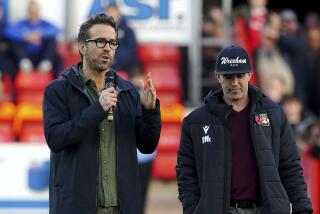Reluctant Millionaires : Tobacco City’s Old Retainers Oppose Buyout
- Share via
WINSTON-SALEM, N.C. — When Roy Cox joined R.J. Reynolds Industries some 32 years ago, he began buying the stock of the cigarette maker.
To date, he has accumulated 4,000 shares of what is now the giant conglomerate RJR Nabisco, the subject of a bidding war that reached a climax Wednesday at $24.5 billion. As a result, the stock Cox bought at an average $18 a share could soon bring him as much as $109 each, and his $72,000 investment would be worth more like $436,000.
Delight Anticipated
You’d think that Cox, a maintenance man in cigarette factory No. 1 downtown, would be delighted. Not so.
Like many of his fellow residents in this tobacco capital who stand to profit handsomely from the sale of RJR, Cox has been quite unhappy. “I think they should leave it like it is,” he said recently. “Because we had a good company going. (But) I reckon I will have to take whatever they give me.”
In the last few weeks, as RJR’s board of directors weighed a possible buyout, there was considerable talk--and worry--about just what a buyout would mean for Winston-Salem and its residents, some of whom may become instant millionaires.
In Winston-Salem, however, RJR Nabisco and its stock are valued in far different terms than on Wall Street, and many resident-stockholders were reluctant to endorse any type of buyout. After all, most of them have longstanding ties to the company, which employs 15,000 people here, and they are mindful of the company’s benevolence to Winston-Salem.
It was more than a century ago that Richard Joshua Reynolds, 24 years old at the time, left his native Virginia for the little frontier town of Winston, N.C., the center for the new flue-cured leaf that made the best chewing tobacco. With a population of 400, it was also on a newly built railroad line. The established Moravian village of Salem, a mile away, was the center of industry and culture at the time, and the two communities eventually became one.
But it was the Reynolds Tobacco Co. that gave the city worldwide renown by naming two of its top-selling cigarette brands after the city.
Today, of course, that company has grown to be a massive food and tobacco conglomerate bragging of such choice brand names as Camel, Salem and Winston cigarettes and Oreo cookies, Nabisco Shredded Wheat and Del Monte fruits and vegetables. Recently, RJR Nabisco moved its corporate headquarters to Atlanta, but its roots remain deep in North Carolina and that is part of what makes a buyout so controversial here.
Much of the Reynolds stock holdings has been in the same families for several generations, and their owners had hoped to pass them on to their own offspring.
Furthermore, many Reynolds stockholders don’t want to pay large taxes on stock they never intended to sell all at once. Finally, observers say, the bulk of these people are blue-collar workers who know little or nothing about the stock market. Their single investment is in Reynolds, and they may have no idea what to do with the windfall they will get from the sale of their company.
Cox is only one of a large number of people who stand to become wealthy overnight--as soon as their company is taken over in a Wall Street leveraged buyout, a term many of them have never even heard. There are people whose shares were acquired for less than $1. Others have inherited stock bought for as little as a dime.
Stockbroker Thomas Goodson of Richmond, Va.-based Wheat, First Securities says that customers have brought him stock certificates that were dated in the 1930s. Reynolds is the largest holding in both his own portfolio and those of his clients.
Indeed, what is happening to this community, where Richard Joshua Reynolds, who died in 1918, established a chewing tobacco factory in 1875 and where the odor of tobacco pervades the entire downtown area, could be compared to a modern-day version of the Gold Rush of 1848. It prompted the Winston-Salem Journal to say the other day that soon there would be a lot of millionaires walking around town in overalls.
“You already know you have an oil well,” says John W. Davis III, a stockbroker with the local office of Alex. Brown & Sons and chairman of the Winston-Salem Chamber of Commerce. “And all of a sudden it turns into a gusher.”
The local holdings are the largest concentration of Reynolds stock outside of New York City, where large institutions are major owners. It is estimated that more than $2 billion in Reynolds stock is owned by Winston-Salem residents. This, several brokers and other observers estimate, would give every man, woman and child an average windfall buyout price of more than $110,000.
Nevertheless, most of these long-term shareholders, despite their quick riches, despise what is taking place. Many would rather that the proposed transaction would go away.
“Some of these people might become millionaires,” said Morrison W. Divine III, the resident manager of the local office of Smith Barney Harris Upham & Co. “But they will be reluctant millionaires. A lot of these people inherited the stock from their fathers or mothers whose last deathbed request was ‘don’t sell the Reynolds stock.’ ”
Many of the Reynolds family--they consist of current employees, retired workers and descendants of workers--said they are worried about the future of the company when outside investors buy it and possibly break Reynolds up and sell it off in chunks.
They say that they don’t expect the new owners to be as generous to Winston-Salem and that Reynolds represented paternalism to a community in the best sense. The Reynolds family and the tobacco company have been responsible for Salem College, Baptist Hospital of Wake Forest University, the Winston-Salem Arts Council and the North Carolina School of the Arts, to name a few. There is a Reynolds High School and a Reynolds Auditorium and a number of Reynolds streets. Somewhere between 15 and 20 family members, now in its fifth generation, still live here.
The other day, workers huddled at the main entrance of factory No. 1 expressing their woes about what is happening. Their biggest worries: the future of their jobs, their pensions and their fringe benefits, such as medical benefits.
One factory worker, identified as “feisty,” had brought along a copy of Time magazine. It told how many people had been laid off in other recent leveraged buyouts. “We helped make this company what it is today but the big guys are the only ones who will benefit,” Feisty said.
Many residents clearly have mixed emotions about the events.
“There is no question that this will be a windfall for me,” says Susan Millaway, whose husband, a Reynolds vice president, died in 1973 after spending his entire working career of 37 years, except for two years’ military service in World War II, with the company. “I am worried about what will happen to the company. It was my husband’s life. His father worked there, also. If my husband were living, he would be very distressed.”
Millaway says that some of her stock was inherited from her father-in-law and some had been purchased by her husband. In the old days, she recalls, RJ Reynolds would loan employees money at 2% interest to buy stock.
Besides their emotional and sentimental attachment to the shares, these stockholders have other more pragmatic reasons for wanting to hang on. For one thing, they don’t want to pay the taxes on their large profits all at one time.
“I had hoped to sell 100 shares this year and another 100 shares next year, and so on,” complains Alvin Parham, a cigarette machine repairman for 29 years who plans to retire next year. “Then my income will not be as big and my taxes will be smaller.”
Parham has been putting 10% of his gross pay into Reynolds stock for the last 6 years while the company has matched this with another 6%. “It’s like they are knocking the props out from under us is the way we feel,” he says.
Brokers say, however, that the appreciation of the stock in the last month will enable them to pay the taxes and still allow them to have significant profits.
A major concern in the community is what the newly rich residents, most of them unsophisticated in financial matters, will do with the money.
Offer Help as Advisers
To be sure, some local financial institutions see an excellent business opportunity. But at the same time they are trying to give the sellers of the Reynolds stock sound investment advise and protect them from charlatans.
“How to make a safe landing with your RJR stock,” read a full page newspaper advertisement of Wachovia Bank & Trust Co. the other day.
“You may never have traded a stock in your life,” the ad continued. “You may be just a loyal RJR shareholder who has done very well over the last few years . . . suddenly everything is up in the air . . . let us show you how to make a safe landing.”
James T. Brewer, executive vice president of Wachovia, says that in his many years at the bank he cannot remember the bank ever running a full page ad for a single community.
“It is pretty clear that the brokers as well as the institutions as well as ourselves are interested in the proceeds,” he says. “We’d like to be able to assist our customers and we’d like to make customers of people who are not customers yet.”
Reynolds shareholders are also worried about maintaining the income they will be getting from their stock.
Urges Reinvesting Funds
“Even though they will be paying taxes,” says Jeffrey Herman, manager of the office of Merrill Lynch, Pierce, Fenner & Smith, “and the dividends they depended upon, like a clock, will no longer be there, if they reinvest (the funds) conservatively, they will be able to double or triple their income.”
Local churches and charities also hope to benefit from the riches that will fall to the city. One church recently held a panel discussion to help explore the alternatives of what to do with its money. Wake Forest University has run ads seeking donations.
And in the last 10 days, the United Way of Forsyth County has run large ads in the local newspaper urging residents to turn some of their shares over to the charity as an alternative to paying taxes.
“Soon you will have to make an important decision about what to do with your RJR Nabisco stock,” the ads said. “And you may not have a lot of time to think about it . . . . Before you sell your RJR Nabisco stock, read what your shares can do. Now, together again, we can continue the tradition of caring for our community’s future.” United Way has created an endowment fund called “Caring Shares” into which the donated stock will be deposited.
Some local stockholders have already sold some of their shares to lock in some profits, brokers say.
Pace of Business Quickens
As a result, local merchants are already feeling a bit of an increase in business. But the biggest spending spree is yet to come, and merchants expect a busy Christmas buying surge.
Thomas David Neill, president of Bob Neill Inc., the local Mercedes, Pontiac and Suburu dealer, says he has already been able to trace the sale of “a couple of Mercedes” to the sale of Reynolds stock.
More to Read
Inside the business of entertainment
The Wide Shot brings you news, analysis and insights on everything from streaming wars to production — and what it all means for the future.
You may occasionally receive promotional content from the Los Angeles Times.










